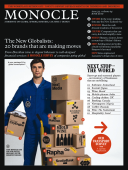
Issue 34
From start-ups to seasoned players, Monocle reports on the companies going global.
In This Issue
Oops! No content was found.
Looks like we no longer have content for the page you're on. Perhaps try a search?
Return Home
Click here to discover more from Monocle

From start-ups to seasoned players, Monocle reports on the companies going global.
Looks like we no longer have content for the page you're on. Perhaps try a search?
Return Home